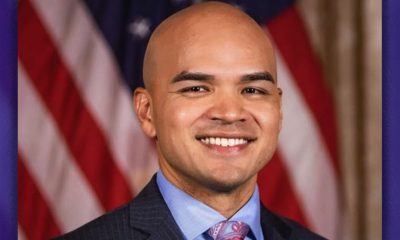Politics
Holder Argues for Success of Drug Sentencing Policies

In this Feb. 11, 2015 file photo, Attorney General Eric Holder speaks to law enforcement officers and guests in the Old Executive Office Building on the White House Complex in Washington. The share of federal drug offenders who received harsh mandatory minimum sentences has plunged in the past year, according to figures obtained by The Associated Press that Holder plans to cite Tuesday in arguing for the success of his criminal justice policies. Experts credit Holder for helping raise sentencing policy as a public issue, but they also say it’s hard to gauge how much of the impact is directly attributable to his actions. (AP Photo/Pablo Martinez Monsivais, File)
ERIC TUCKER, Associated Press
WASHINGTON (AP) — Federal prosecutors are changing the way drug defendants are charged and punished, Attorney General Eric Holder said Tuesday, unveiling statistics that show sentences are increasingly being based less on rigid formulas and more on the circumstances of each crime.
It’s a signature issue for Holder’s legacy as he prepares to leave the Justice Department in a matter of weeks as its first African American attorney general.
New data compiled by the U.S. Sentencing Commission show a shift over the last year in which prosecutors steer away from seeking the harshest punishments for low-level drug offenders and redirect their resources to go after more violent criminals.
The figures show federal prosecutors pursued mandatory minimum punishments in roughly 51 percent of drug cases, the lowest rate on record, in the year that ended last September. That was down from 64 percent the year before.
Overall, the number of federal drug trafficking prosecutions dropped by 6 percent during the same period, which Holder said was proof that prosecutors are getting pickier in the federal cases they bring.
“The changes that we have implemented are firmly taking hold,” Holder said in a speech at the National Press Club. “And our key reforms appear to be successful by every measure that we have taken and that we have seen so far.”
For decades, law enforcement authorities have measured success by the numbers of convictions and the length of prison terms, an approach seen as particularly useful during the 1980s-era crack epidemic. In keeping with that stance, a 2003 memo from then-Attorney General John Ashcroft directed prosecutors to charge the most serious provable crime against defendants.
But in six years as attorney general, Holder sought limits on long drug sentences as a matter of fairness and cost and promoted a sentencing regime based more on the facts of a case and less on formulas. A key goal was to help limit an overcrowded prison population bloated with drug offenders.
In August 2013, he announced a package of changes called “Smart on Crime,” which directed prosecutors to avoid charging non-violent drug offenders with crimes that carry mandatory minimum sentences — rigid, usually years-long punishments that are generally dictated by drug quantity and restrict a judge’s discretion.
Justice Department prosecutors have expressed concern that gestures of leniency would limit their leverage to negotiate plea deals. But in the last fiscal year the percentage of guilty pleas has held steady, along with the percentage of drug defendants who received credit for cooperation, which the Justice Department says belies the prosecutors’ concerns.
Even as the overall number of federal drug trafficking prosecutions dropped from 22,215 to 20,824 — a 6 percent decline — the average suggested minimum prison term in those cases rose from 96 months to 98 months, which Holder maintained proves prosecutors are focusing on more serious crimes.
Still, it’s not clear from the limited snapshot whether the numbers reflect a new normal, or will continue to fluctuate as they have for most of the last decade.
And while experts credit Holder for helping raise sentencing policy as a public issue, some also say it’s hard in a complex and interrelated criminal justice system to gauge how much is directly attributable to the attorney general’s policy shift.
“I think it’s impossible to identify one factor that is going to be the cause of all the change,” said Julie Stewart, president of Families Against Mandatory Minimums. “But I don’t think it’s wrong to give Holder some credit for caring about who’s in prison or trying to get his U.S. Attorneys not to overcharge.”
Even before Holder’s policy announcement 18 months ago, long drug sentences were already facing scrutiny and some downward-pointing trends were already starting to take shape.
In the last decade, for instance, the U.S. Supreme Court made sentencing guideline ranges advisory rather than mandatory and President Barack Obama signed a law to cut crack cocaine penalties. Last year, the Sentencing Commission — an independent panel that sets sentencing policy — slashed guideline ranges for drug crimes and applied those changes retroactively.
Though Holder’s departure is imminent, the Justice Department budget proposal includes funds to study the new policy’s impact over the next year.
His expected successor, Loretta Lynch — the top federal prosecutor for parts of New York — voiced general support for “Smart on Crime” at her confirmation hearings but faced only limited questions about drug sentencing policy, a likely indication that an issue once seen as politically volatile has now gained far more mainstream acceptance.
“To the extent that he’s helping to open up the climate and helping to give a greater level of comfort to mainstream lawmakers, that would be one of the most significant long-term effects of his tenure,” said Marc Maurer, executive director of the Sentencing Project.
____
Associated Press writer Michael Tarm in Chicago contributed to this report.
Copyright 2015 The Associated Press. All rights reserved. This material may not be published, broadcast, rewritten or redistributed.
Activism
Oakland Post: Week of April 23 – 29, 2025
The printed Weekly Edition of the Oakland Post: Week of April 23 – 29, 2025

To enlarge your view of this issue, use the slider, magnifying glass icon or full page icon in the lower right corner of the browser window.
Activism
Oakland Post: Week of April 16 – 22, 2025
The printed Weekly Edition of the Oakland Post: Week of April 16 – 22, 2025

To enlarge your view of this issue, use the slider, magnifying glass icon or full page icon in the lower right corner of the browser window.
Activism
Oakland Post: Week of April 9 – 15, 2025
The printed Weekly Edition of the Oakland Post: Week of April 9 – 15, 2025

To enlarge your view of this issue, use the slider, magnifying glass icon or full page icon in the lower right corner of the browser window.
-

 Activism4 weeks ago
Activism4 weeks agoOakland Post Endorses Barbara Lee
-

 Activism4 weeks ago
Activism4 weeks agoOakland Post: Week of March 28 – April 1, 2025
-

 Activism3 weeks ago
Activism3 weeks agoOakland Post: Week of April 2 – 8, 2025
-

 #NNPA BlackPress3 weeks ago
#NNPA BlackPress3 weeks agoTrump Profits, Black America Pays the Price
-

 Activism2 weeks ago
Activism2 weeks agoOakland Post: Week of April 9 – 15, 2025
-

 #NNPA BlackPress3 weeks ago
#NNPA BlackPress3 weeks agoHarriet Tubman Scrubbed; DEI Dismantled
-

 #NNPA BlackPress3 weeks ago
#NNPA BlackPress3 weeks agoLawmakers Greenlight Reparations Study for Descendants of Enslaved Marylanders
-

 #NNPA BlackPress3 weeks ago
#NNPA BlackPress3 weeks agoTrump Targets a Slavery Removal from the National Museum of African-American History and Culture

























































